My Pitch to Turn The Postman Into a Graphic Novel
The post-apocalyptic 90s movie with Kevin Costner is based on a really great novel. In 2020, I tried to turn it into a comic.
In 2020, there was a series of crises—you may remember this—and in the summer leading up to the president election, The Postmaster General Louis DeJoy, a corrupt Republican fundraiser and business man, intentionally slowed down the mail. I did one of my post-apocalyptic political cartoons about it and referenced The Postman, the 1997 movie Kevin Costner.
Someone online responded to the comic telling me I had to read the original 1985 novel by David Brin, which, they assured me, was Actually Good. I skimmed the Wikipedia page for the plot, which featured an array of interesting elements that definitely didn’t make it into the film—an AI ruling a city, a badass Native leader, and genetically modified super soldiers! It took place throughout Oregon, a state I had lived in and loved for 14 years and was preparing to permanently leave. So I read The Postman, then immediately re-read it, taking notes on how I’d turn it into a graphic novel.
The novel dealt in big ideas—how ideologies rally around symbols and individuals, political violence, and the agreed upon lies that form a society—that resonated with me in that summer of unraveling. I now saw the story without Kevin Costner on horseback carrying the American Flag to a soaring score. Maybe I could take this thing largely remembered as a 90s movie flop and do something relevant and strange with it in comics form. Anyway, I needed a new project to focus on.
I reached out to Daniel Irizarri, a cartoonist and illustrator who I knew could nail the tone I was looking for, and we got to work on some sample pages. Those would show three key moments in the story, which would be set in our present day, 16 years after the total collapse of society. A post-internet, but pre-smartphone society. The perfect place to call it a day, really. And if we got this project in the works, it could come out in, say, 2023 as we exited the pandemic.
It was never meant to be, but I’m sharing the pitch here because I think it is interesting enough to sometimes take a look at the projects that don’t get made. Below is a one-pager outlining some major themes and locations for our version. Many are derived from the original novel with a few new additions. I have not seen the movie since its release and hadn’t plan to rewatch it or reference it in any way.
This was not a pitch to publishers, but rather to the author David Brin, to bring him on board with licensing the rights. A simple email could be ignored; I wanted to show him the work. He did like it and tried to move it forward, but The Postman is wrapped up in other ways and it couldn't work out. That happens. I had to take the swing.
David Brin’s The Postman by Matt Bors and Daniel Irizarri
The Postman graphic novel will tell the story of Gordon Krantz and his journey through the Pacific Northwest 16 years after a series of major crises wiped out most of humanity, society, and technology.
As the sky clears from years of ash, and isolated remnants of survivors consider reemergence, Gordon bluffs his way through a series of small towns posing as a Postman and Inspector General of the Restored United States, linking communities that must come together to confront the brutal survivalist Holnists pushing in from Southern Oregon.
Hewing closely to the events in the novel, this adaptation of The Postman will build on the book’s themes of recovering from deep crises, the work of nation-building, anti-government violence, and who will take responsibility for establishing an ordered and just society. Also, of course, the telling of lies that grow beyond your ability to contain them, for better and worse.
Through the comic, readers will visit a number of towns that highlight different aspects of the crisis, experiences of those who lived through it, and separate ideological fiefdoms that have thrived in isolation from each other. The Postman will visit the towns of:
Pine View, a community dedicated entirely to couples and the reconstruction of family units to rebuild society, where Gordon will have to pay a unique toll in order to pass through.
Oakridge, an isolated town living in fear of a long-gone deadly virus run by a paranoid mayor, who uses fear of a pandemic to retain power over the small village.
Cottage Grove, a Black-led town of people who banded together as they fell through the cracks during society’s collapse and subsequent Holnist raids. With vast reserves of old electronics and Oregon wine they have begun trading with Cyclops.
Corvallis, a city restarting technology and led by the mysterious A.I. Cyclops—in truth, a Mechanical Turk run by the women scientists of what used to be Oregon State University, in a bid to head off male-dominated leadership.
SugarLoaf Mountain, a micronation of Native Americans, loggers, and immigrants who have formed a secure self-sustaining hamlet for themselves and have no real interest in reestablishing the United States.
Lastly, the feudalistic Holnists, a militia movement based on the writings of the long-dead Nathaniel Holn. Once a large nation-wide movement, they are thought to be almost all gone by the start of the story. Holnists subscribe to an extreme survivalists ethos, shun government, and raid others for supplies—enslaving survivors. For reasons unknown, they begin pushing up from Southern Oregon.
The Postman will tell a story very relevant to today: one of a nation recovering from overlapping crises, confronting the threat of neo-fascism, surviving through community, what rights and public services a society should fundamentally strive to provide, and the endless struggle to make those ideals a reality.
For the story as it was told, read The Postman by David Brin.
Before I go. For a few years I have done some work with the comics app Tinyview, an attempt to recreate the feel of a newspaper comics section in the post-newspaper age. Crucially, it pays creators well. I’ve helped to bring in Rob Rogers, Gemma Correll, and others—The Nib has its own channel there. Tinyview is raising funds right now to become a sustainable venture through monthly subscriptions from readers, so head over there and see if there’s something for you.
Also: my new comic Justice Warriors comes out in two weeks on February 21. Call your local comic shop or bookstore and order one or grab a copy through me.

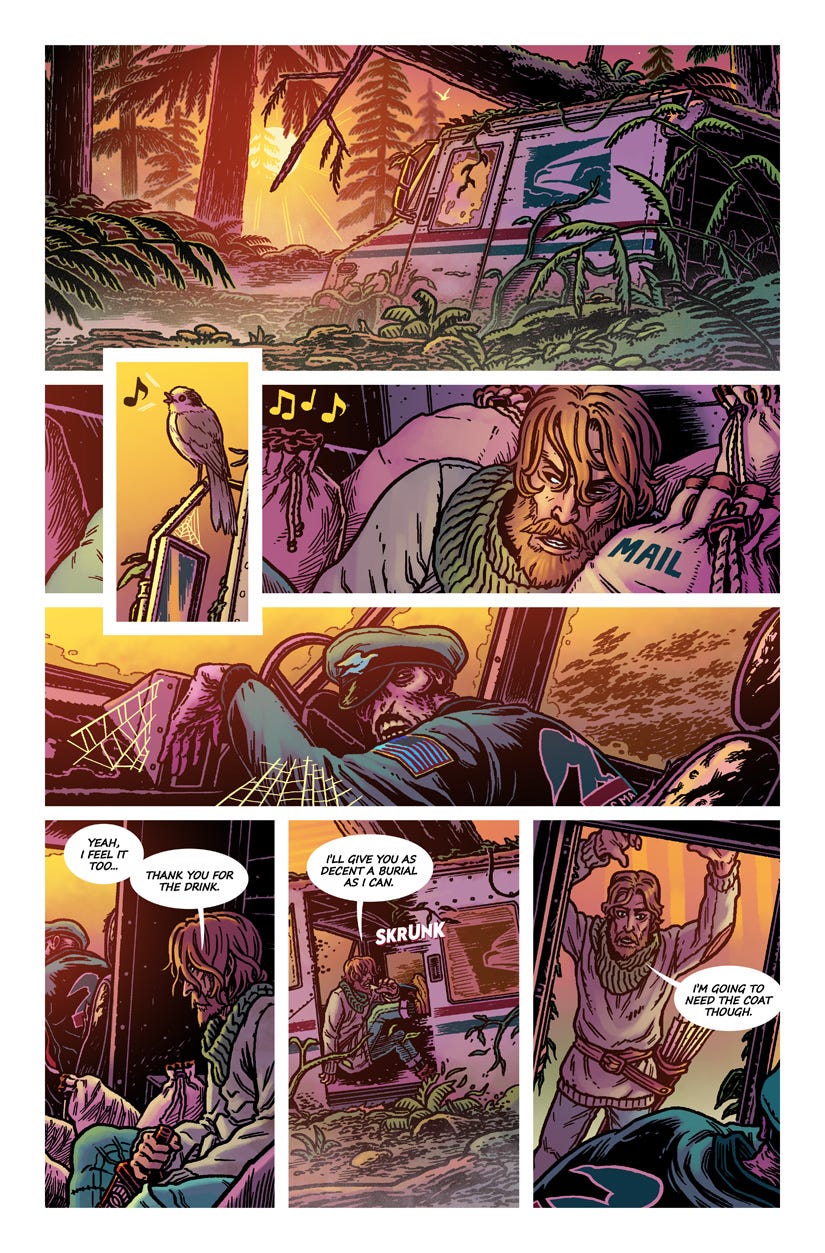
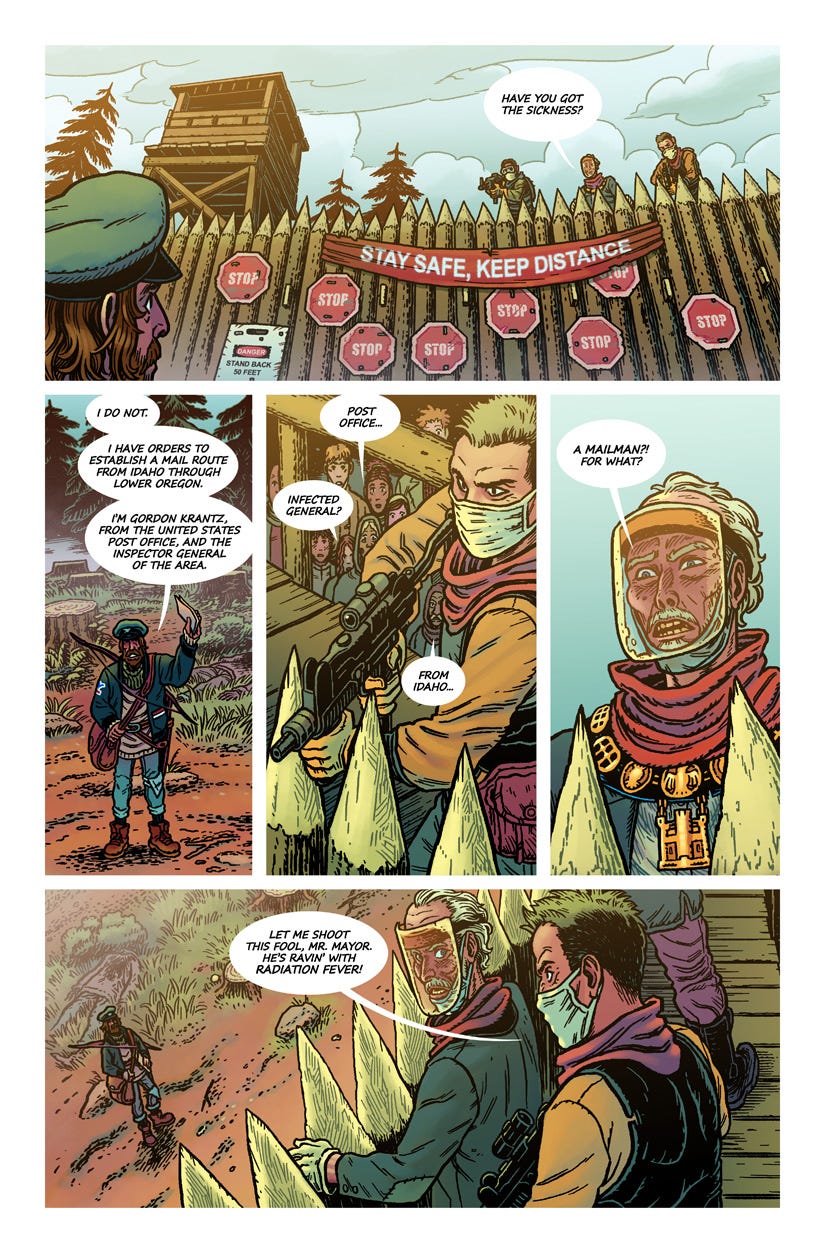
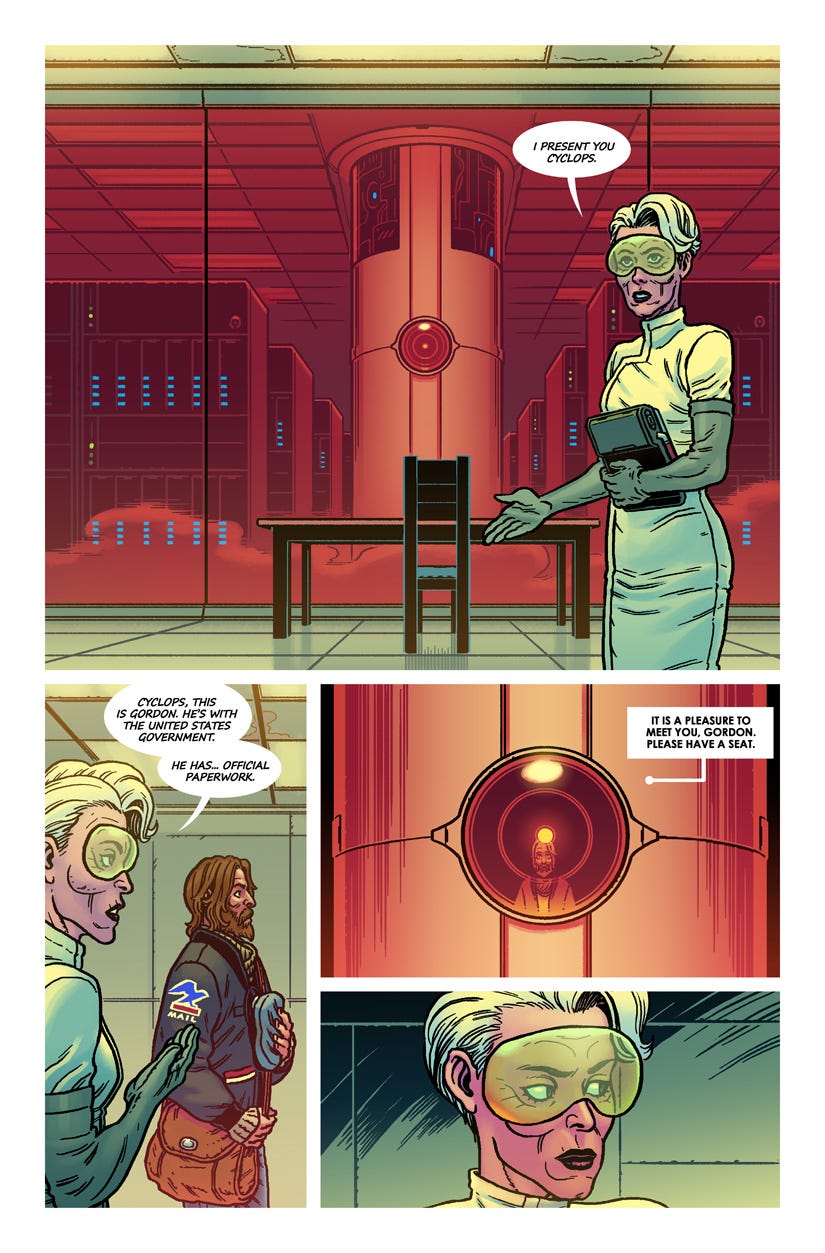
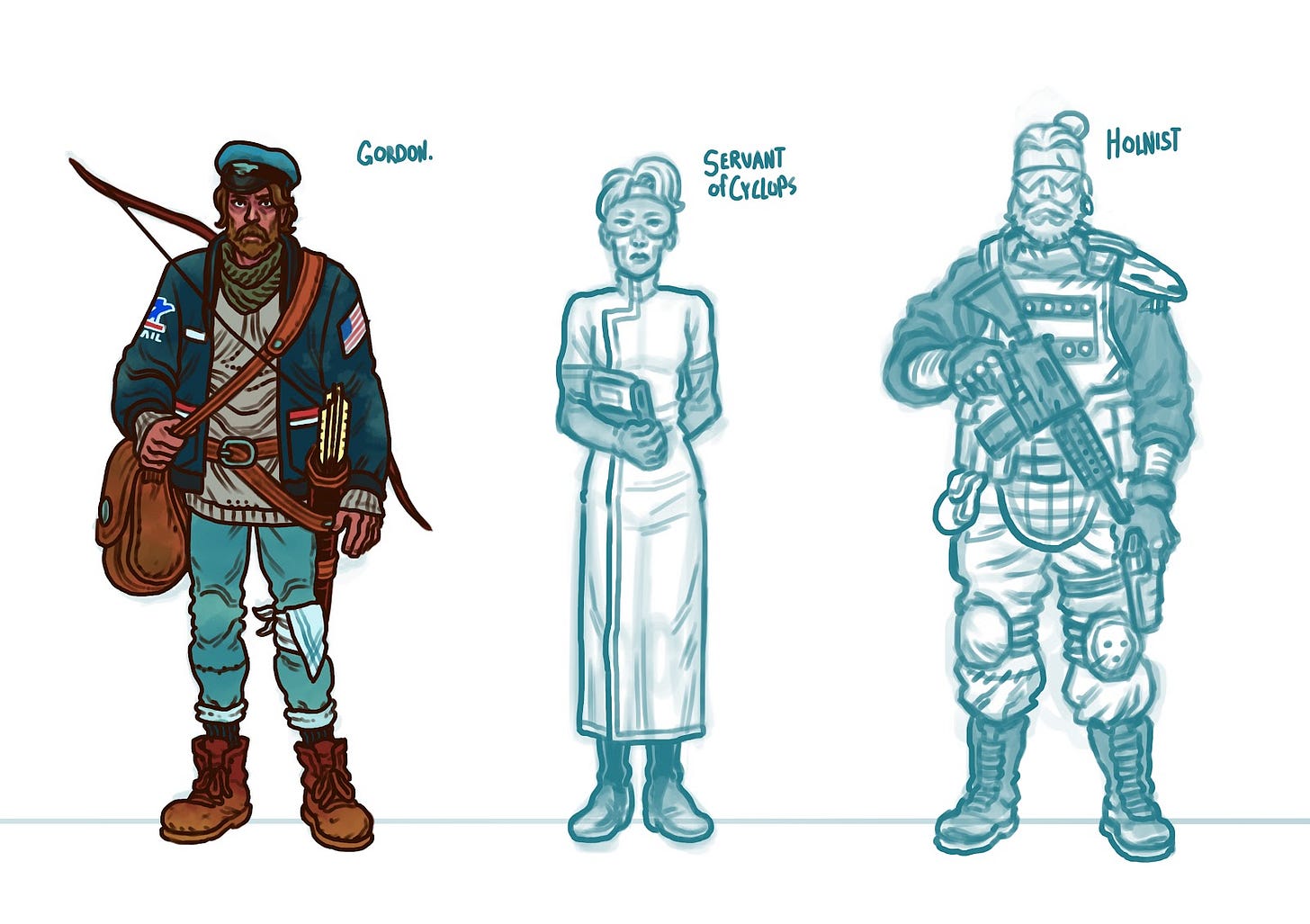
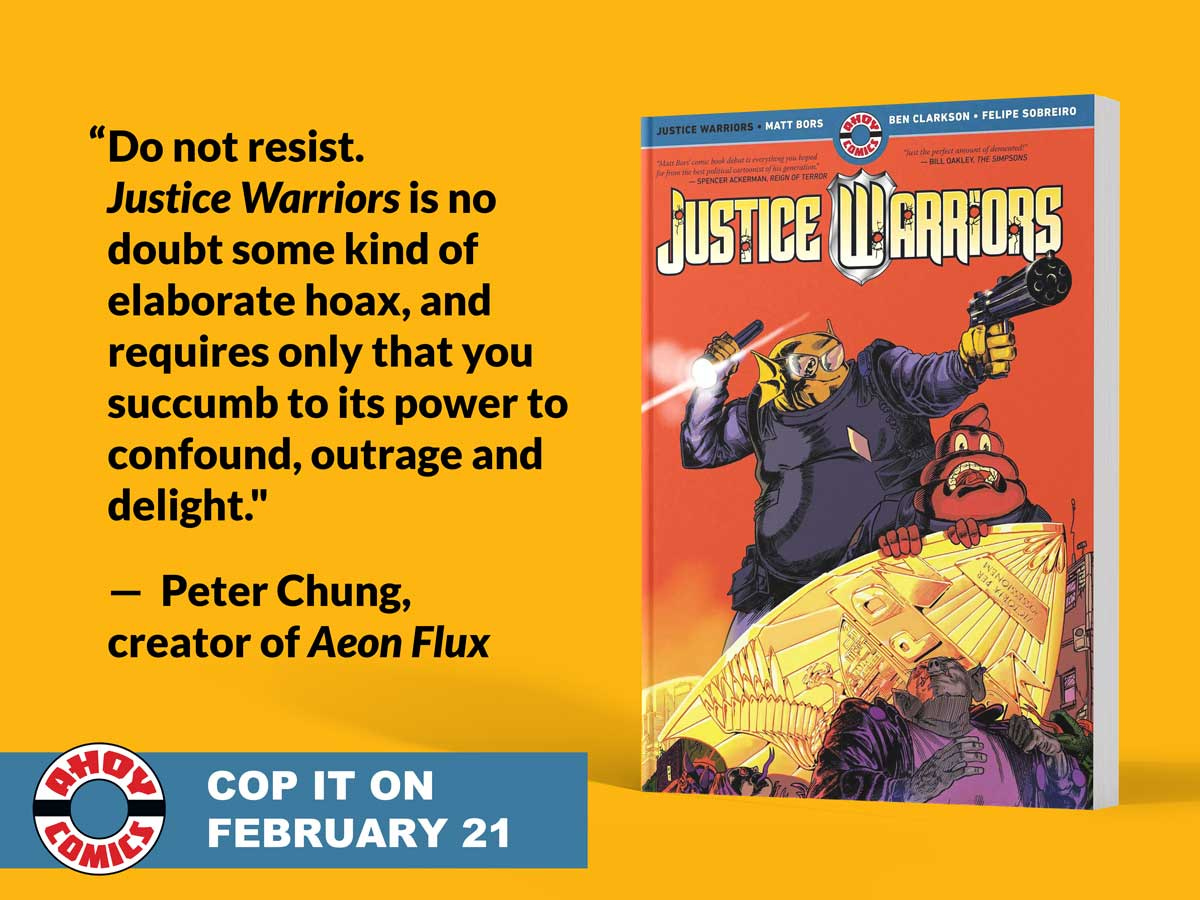
You know what's funny, I've been thinking about getting into making video games with Unity, and The Postman, based on the novel, was one of the ideas I had for a scenario. I think, like you, I was inspired by the recent pandemic and how in The Postman it's the preppers who largely become an impediment to reestablishing what you call a just society. I thought it would be an interesting spin on the post-apocalyptic genre for a game. Anyway, just thought I'd share that tidbit. Can't wait to receive Justice Warriors in the mail.